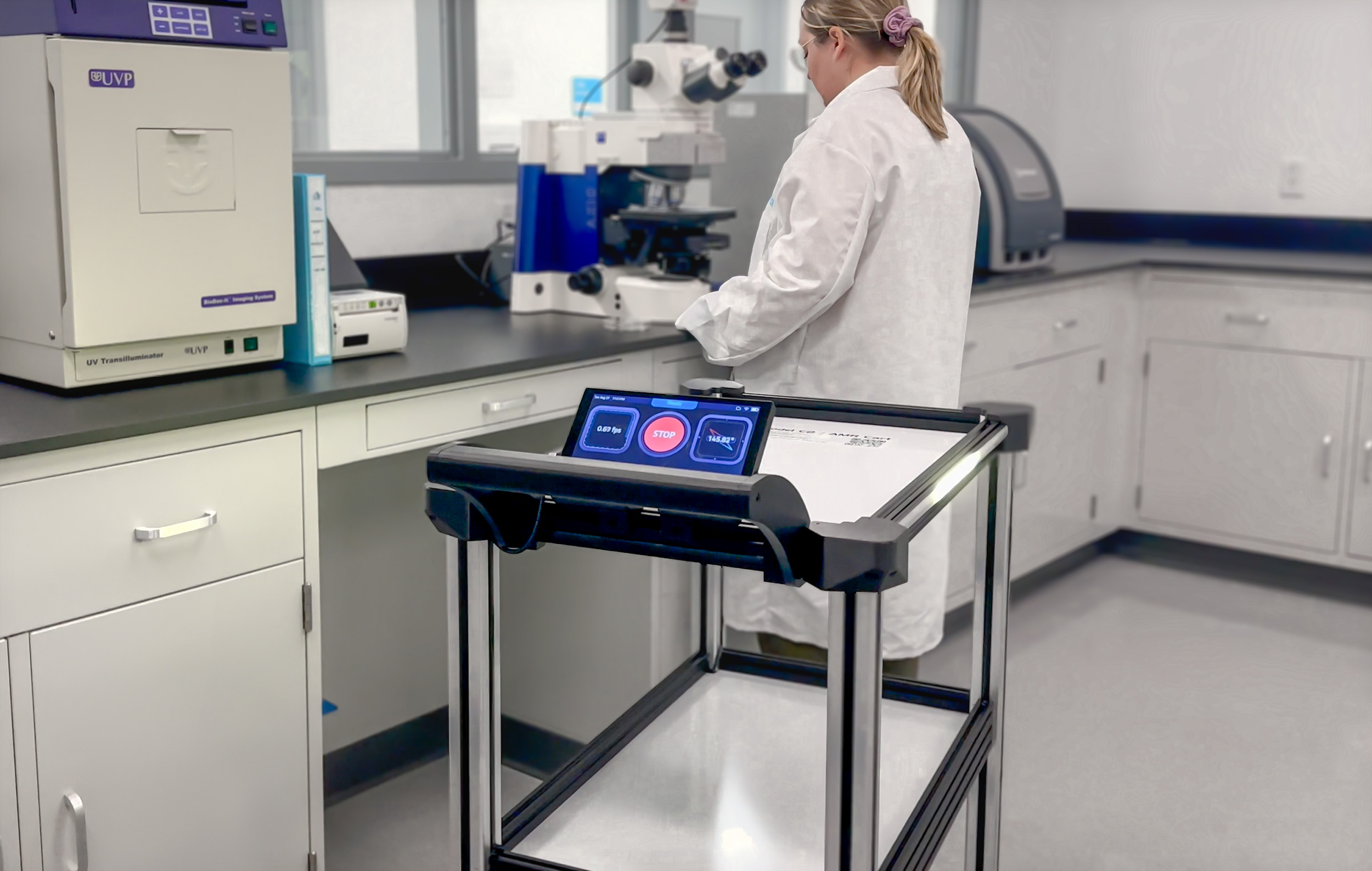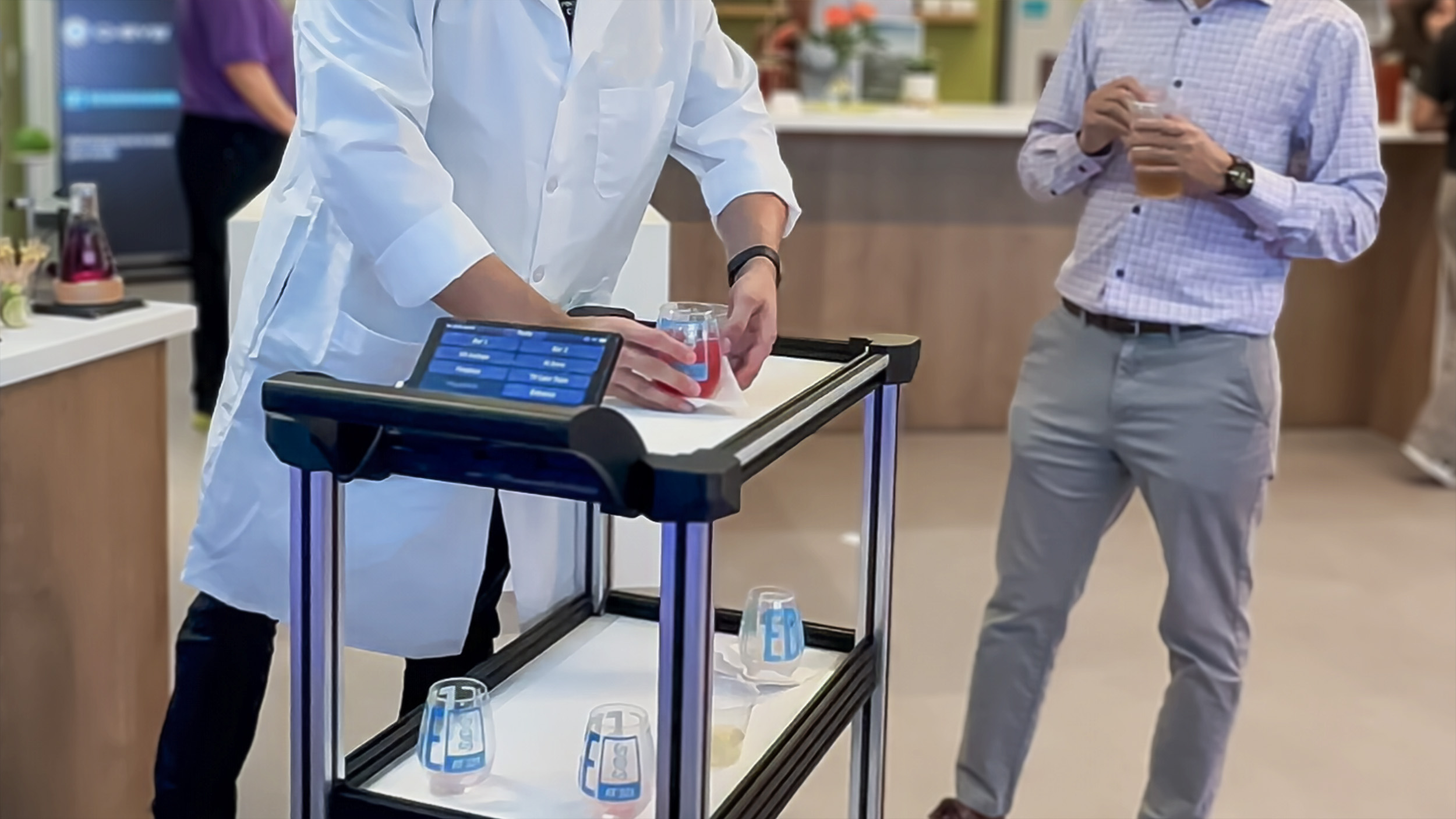The Focus Dividend: How Autonomous Delivery Carts Protect Your Most Valuable Asset
Skilled and specialized talent creates modern business value. Whether in manufacturing, R&D, healthcare, or technology, companies invest heavily in professionals with advanced skills and expert knowledge, hoping to fortify their competitive advantage.
But what happens when these high-value contributors spend their day interrupted by basic logistics tasks?
Think of the engineer who breaks concentration to retrieve components, the lab technician who pauses critical testing to fetch supplies, or the skilled assembler who stops work to deliver finished products.
Research shows interruptions aren’t just momentary pauses. They reset mental processes, with professionals needing up to 23 minutes to fully regain their previous focus after a distraction. For specialized work requiring deep thinking or complex problem-solving, these disruptions fundamentally undermine performance.
Delivery Cart Robots: The Simplest Way to Give Time Back to Your Experts
The most strategic automation isn’t about replacing skilled workers – it’s about supporting them. By introducing mobile robots to handle routine material movement, you make a direct investment in employee well-being and job satisfaction.
Autonomous delivery carts provide a non-intrusive, cost-effective way to let your experts focus on what they do best and enjoy most. This approach delivers measurable returns by preserving your most valuable resource: the focused expertise and enthusiasm of professionals fully engaged in meaningful work.

When Expertise Gets Sidetracked: The True Cost of Material Errands
“Deep work” is a state classified by distraction-free concentration where professionals are able to tackle their most challenging problems at their highest cognitive capacity.
It’s the zone where engineers solve complex design issues, analysts spot patterns in data, and technicians troubleshoot with intuitive expertise. Research by psychologist Mihaly Csikszentmihalyi shows that this mental state:
- Takes an average of 15 – 23 minutes to fully achieve
- Increases complex problem-solving capacity by up to 500%
- Creates the conditions for innovation and delivers the deepest levels of satisfaction and engagement for skilled professionals.
In other words, when specialists are allowed to enter this “flow state”, complex problems unravel, creativity flourishes, and quality reaches peak levels.
Robotic Delivery Carts: Preserving Mental Momentum
According to research from the University of California, the typical professional now switches tasks every 3 minutes, with material retrieval being a primary cause in manufacturing, healthcare, and lab environments. Each switch doesn’t merely pause work – it creates a cognitive “debt” that must be repaid through mental recovery time.
On-demand internal transport of supplies and materials is an effective tool to target this exact operational weakness. While the concept of a robotic cart may seem straightforward, this simplicity is its strength – offering a non-disruptive material delivery solution that’s both cost-effective and quick to implement compared to more complex automation systems.
Consider how differently the same workday unfolds:
Without Robotic Cart Support:
- 9:05 AM: Engineer begins analysis of production data
- 9:17 AM: Walks to retrieve reference materials from storage
- 9:28 AM: Returns and attempts to re-engage with analysis
- 9:41 AM: Finally regains mental momentum
- 10:12 AM: Leaves workstation to collect component samples
- 10:23 AM: Returns and restarts mental engagement process
With Autonomous Delivery Cart:
- 9:05 AM: Engineer begins analysis of production data
- 9:17 AM: Requests materials via system, continues work
- 9:24 AM: Delivery cart arrives with materials, minimal disruption
- 11:30 AM: Completes analysis, having maintained flow state
Each interruption doesn’t just cost the walking time – it creates a cognitive reset that demands significant mental energy to overcome. This invisible drain accumulates throughout the day, leaving your most valuable minds exhausted not from productive work, but from the constant strain of re-establishing focus and mental context.
When skilled professionals must routinely abandon their stations for material retrieval, they experience not only diminished productivity but growing frustration at being unable to fully apply their expertise. AMR automation directly addresses this cognitive burden, creating protected mental space for your most complex and valuable work.
Skilled Talent Retention: What AMR Automation Communicates to Your Team
Each time a skilled professional is diverted to perform basic material transport, an unintended message is sent: “Your specialized expertise is interchangeable with basic courier work.”
The experience of consistently being pulled away from skilled work to perform basic material transport creates a specific form of workplace dissatisfaction
When Trivial Tasks Signal Low Value: AMR Robots as a Statement of Professional Respect
Underutilization creates a disconnect between professional identity and daily reality, and the employee experience is negatively affected by:
- Diminished Sense of Value: Specialists begin questioning whether their expertise is truly appreciated when regularly asked to perform tasks that anyone could do.
- Engagement Level Erosion: The gap between “what I was hired to do” and “what I actually spend time doing” creates ongoing frustration.
- Higher Stress Response: Constantly switching between complex tasks and simple retrieval erodes mental energy and focus
- Lower Retention Rates + Commitment: Trust in leadership diminishes and skilled workers ares more likely to seek new positions
Autonomous delivery carts reverse this dynamic by creating a clear operational distinction: specialized work deserves protection from routine interruption. This isn’t merely about efficiency – it signals that the organization recognizes the difference between general tasks and specialized expertise.
When mobile robots handle material transport, the message becomes: “Your knowledge and focus are too valuable to dilute with basic logistics.” This message resonates with talented team members, who prefer environments where their true abilities are well-utilized.
The result transforms individual satisfaction and team dynamics. Specialists can focus on their core expertise with creativity and commitment – creating a workplace where talent is used effectively, instead of unnecessarily.

Autonomous Delivery Carts Pay Double Returns: Efficiency Gains and the Human Dividends
Material movement in operations has traditionally been viewed through the lens of physical efficiency – distance traveled, time spent, energy expended. This perspective misses a crucial dimension: the cognitive impact of these movements when performed by skilled professionals whose primary value lies in their mental capabilities.
Quantifiable Productivity: The Direct Returns
The immediate efficiency gains from implementing robotic delivery carts are straightforward to measure. When skilled professionals remain at their workstations rather than retrieving materials, the direct time savings quickly accumulate across your operation.
In most facilities, specialists spend a significant portion of their day on material movement – time that could be dedicated to their core expertise. For a team of specialists, this diverted time represents substantial productive capacity spent walking rather than applying specialized skills.
When autonomous delivery carts handle transport, this time is recaptured for productive work. The financial calculation is simple: multiply the labor cost by the hours saved – and for specialized roles with higher hourly rates, the savings become substantial, even for modest-sized teams.
- Complex tasks are completed more efficiently when performed in continuous sessions rather than fragmented blocks
- Error rates decrease when specialists maintain mental context
- Problem-solving capabilities improve when professionals can maintain continuous thought processes
The Human Dividend: Your Employee Experience Is Your Long-Term Value
Beyond measurable productivity gains lies what might be called the “human dividend” of robotic cart implementation – a cluster of benefits related to workforce experience that delivers ongoing returns:
- Reduced mental fatigue: Specialists experience less cognitive drain when freed from constant task-switching
- Lower burnout risk: The frustration of expertise interruption is eliminated, reducing chronic stress
- Increased job satisfaction: Work aligns more closely with professional identity and training
- Enhanced skill development: More time spent on core expertise accelerates mastery and innovation
Unlike the immediate efficiency gains, these human factors compound over time. Specialists who experience work environments that respect their expertise develop deeper commitment to both their craft and the organization that enables it.
Empowering People, Not Just Processes, with Smart Automation
Smart automation should enhance human contribution, not replace it. When considering robotic delivery carts, the main benefit moves past operational efficiency – and becomes about protecting the focused attention of your skilled professionals.
When mobile robots handle material transport, they eliminate interruptions that pull specialists away from their core work. This preserves the mental focus needed for complex problem-solving and innovation.
Key Takeaways for Leadership:
- Protected Focus: AMR robots eliminate interruptions that fragment specialist attention and reduce productivity.
- Better Engagement: Skilled professionals who stay on task experience higher job satisfaction and contribute more value.
- Competitive Edge: When your specialists can focus on applying their expertise without logistical distractions, your operation gains an advantage.
- Complete ROI Picture: While efficiency gains are measurable, the improvements in work quality and talent retention often deliver even greater value.
Next Steps:
Identify where your specialists currently face interruptions for basic material movement. Consider how autonomous delivery carts could eliminate these distractions while improving both productivity and job satisfaction.
Look for automation opportunities that support your skilled workforce rather than simply reducing headcount. The best technology investments remove barriers that prevent your team from applying their full capabilities.
Final Point:
Investing in robotic carts isn’t just about moving materials more efficiently – it’s about creating a workplace where your skilled professionals can apply their expertise consistently. This approach delivers both immediate productivity gains and long-term benefits through higher engagement, better retention, and more innovative contributions from your most valuable team members.
To see how the Model C2 autonomous delivery cart can help protect your specialists’ focus while improving material flow, visit quasi.ai/c2-cart or contact our team for a consultation on your specific operational needs.RetryClaude can make mistakes. Please double-check responses.